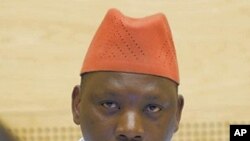The International Criminal Court on Friday reversed an order to release alleged Congolese warlord Thomas Lubanga. The trial can now resume.
Judge Sang-Hyun Song read out the decision of the Appeals Chamber of the International Criminal Court, or ICC.
He said the decision to resume the trial meant Lubanga would not be immediately freed.
"The appeals chamber finds that the decision to release Mr. Lubanga Dyilo was predicated on the decision to stay proceedings," explained Song. "As the latter decision is reversed, so too the decision to release Mr. Lubanga Dyilo must be reversed."
Why he's on trial
Lubanga is on trial at the ICC accused of recruiting child soldiers to fight for his Union of Congolese Patriots in the Democratic Republic of Congo.
In July the judges halted Lubanga's trial and ordered that he be freed. They said a fair trial was no longer possible because the prosecution refused to obey court orders. Prosecutor Luis Moreno Ocampo had refused a court order to reveal the identity of an intermediary used between investigators and alleged victims because he said the intermediary would not be safe if identified.
Reaction
Geraldine Mattioli from the international body, Human Rights Watch, says the decision to resume proceedings is a good one.
"It's a decision that will enable the victims to see justice done in this case and to hear whether Lubanga is guilty or innocent of the crimes against him," Mattioli said.
This was not the first time the trial has been held up. Prosecutors have disputed with the court in the past over the admissibility of evidence.
Potential obstacles
But Mattioli says these are expected stumbling blocks - Lubanga's is the ICC's first case and she says there's many lessons to be learned.
"One does not have to be surprised of course that things take time and different aspects of the procedure need to be tested," noted Mattioli. "These kind of decisions hopefully helped clarify the way the [court] would function for future trials."
Lubanga denies the charges made against him. He says he was not a warlord in the DRC, but a politician.
ICC to Resume Congolese Warlord Trial




